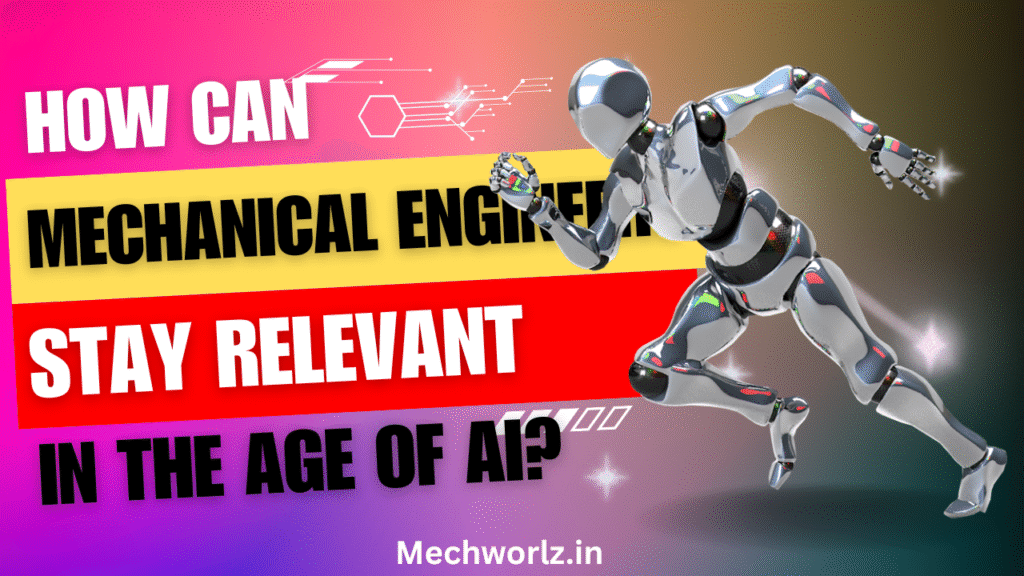
How Can Mechanical Engineers Stay Relevant in the Age of AI?
Artificial Intelligence (AI) is no longer just a buzzword—it’s becoming a core part of engineering, manufacturing, and design. For mechanical engineers, this shift may feel like a challenge. Some even wonder:
“Will AI take over my job?”
The good news? AI is not here to replace mechanical engineers—but to empower them. In fact, those who adapt and evolve will find exciting new opportunities ahead.
In this blog, we’ll explore practical ways mechanical engineers can stay relevant, future-ready, and in-demand in the age of AI.
🔍 1. Understand What AI Really Is
Before anything else, it’s important to understand what AI actually means in the context of engineering.
AI refers to machines or systems that can mimic human intelligence—learning from data, recognizing patterns, and making decisions.
In mechanical engineering, AI is used in:
Predictive maintenance (identifying equipment failures before they happen)
Smart manufacturing systems (real-time process control)
Design optimization (AI-generated component designs)
Robotics and automation (intelligent systems that adapt to environments)
📘 Tip: Start with basic courses in AI, machine learning, and data science. Free platforms like Coursera, edX, and YouTube offer beginner-friendly content.
💻 2. Learn to Work with AI Tools & Software
You don’t need to build AI—but you should know how to use AI-powered tools in your engineering tasks.
Examples:
Generative Design Software: Tools like Autodesk Fusion 360 or SolidWorks use AI to generate multiple design options based on performance requirements.
Simulation Tools with AI Integration: Faster testing and design iterations.
AI in CAD/CAM Software: Smart suggestions, automated dimensioning, and error detection.
📘 Tip: Invest time in learning software with AI and automation features—they’re becoming the new industry standard.
🧠 3. Sharpen Human Skills That AI Can’t Replace
While AI can analyze data, it can’t match human creativity, intuition, or hands-on experience—skills that are central to mechanical engineering.
Focus on developing:
Problem-solving abilities
Creative thinking
Conceptual design skills
Cross-functional communication
These skills are critical for innovation, especially when collaborating with teams across electrical, software, and data fields.
🤖 4. Embrace Robotics, Mechatronics & Automation
As factories become “smart” and connected, mechanical engineers play a key role in designing:
Automated production lines
Robotic systems
Intelligent sensors and actuators
Learning about mechatronics (a mix of mechanical, electrical, and control systems) gives you a strong edge in modern industry.
📘 Tip: Explore PLCs, sensors, IoT, and embedded systems—especially if you’re working in manufacturing, automotive, or industrial equipment.
📈 5. Upskill Continuously—Stay Ahead of the Curve
The pace of technology is fast. What you learned five years ago may already be outdated.
Here’s how to keep growing:
Take online certifications in AI, Python, data analysis, digital manufacturing, etc.
Attend webinars, tech expos, and conferences
Subscribe to engineering journals and YouTube channels
Join communities on LinkedIn or Reddit for tech updates
🎯 Staying updated shows employers and clients that you’re proactive, future-focused, and ready for the next challenge.
✅ Conclusion
The rise of AI is transforming how industries operate—but it’s not the end for mechanical engineers. Instead, it marks the beginning of a new, exciting chapter. Engineers who are willing to adapt, learn, and collaborate with AI will not only remain relevant—they will lead innovation.
Mechanical engineers still have a crucial role to play in design, production, problem-solving, and real-world applications that machines cannot fully replicate. By embracing new tools and constantly upgrading your skills, you’ll stay ahead in this AI-driven era.
Stay skilled. Stay smart. Stay relevant.
